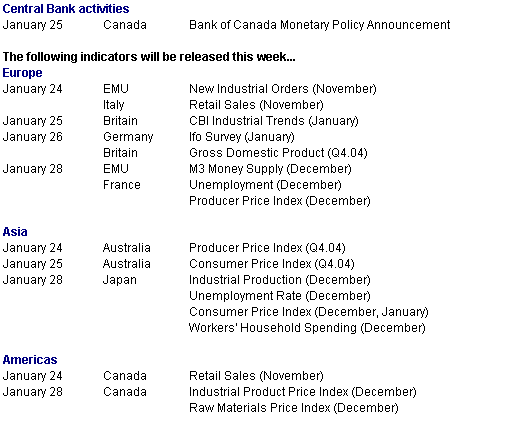Monday, January 24, 2005

Global Markets stumble
While the week started optimistically, things faded rapidly as earnings disappointments hit many indexes and currency traders tried to make sense of the latest moves of the dollar, yen and euro. The dollar's January appreciation against the euro has quieted some critics, but not all European rhetoric. Last week the rhetoric turned to the ailing Growth and Stability Pact where political leaders clashed on the Pact's viability and necessity. (The Pact sets a deficit-to-GDP ratio of no more than 3 percent for each member country - a level pierced by Germany, Italy, France and several others.)
Equity markets have been sluggish so far this year, but this could be blamed on nervousness over fourth-quarter earnings or to the rebound in oil prices as frigid temperatures swoop down from Canada on the U.S. northeast. Nevertheless, the Kospi and STI in Asia managed to end the week on the plus side as did the S&P/TSX composite.
Global Stock Market Recap

Europe and Britain
European and British stocks made a firm start to the trading week. The FTSE, CAC and DAX all posted gains paced by Royal Philips Electronics NV and Nokia amid optimism that profit growth would be sustained. Some investors picked up where they left off on the previous Friday, chasing the mining and steel stocks that have outperformed while awaiting further direction from the U.S. reporting season. (U.S. markets were closed on Monday so overseas markets were on their own.) The mood remained reasonably bullish, reflecting hopes of more takeover action.

But the indexes were pressured by disappointing earnings results, especially in the technology sector. And the DAX fell as shares of insurers such as Munich Re dropped on concerns that share prices exceed the outlook for profits. Munich Re, the world's largest reinsurer, lowered its 2004 earnings estimate for a second time in less than three months after HVB Group, a subsidiary, wrote down the value of its real estate portfolio by �2.5 billion ($3.25 billion).
British stocks - especially of retailers - lost ground on dismal December retail sales, which plummeted 1 percent (even though National Statistics warned the data had major seasonal adjustment problems). Both the FTSE and DAX were down on the week. The CAC managed to regain the week's losses, however, thanks to strong data on the consumption of manufactured goods released Friday morning. (See indicator scoreboard below.)
Asia/Pacific
Stocks in Japan dropped to a five-week low Friday thanks to sinking technology stocks. Tokyo shares fell to a five-week low on Friday after Sony, the technology sector bellwether, cut its operating profit forecast by 31 percent. Sony's downward revision, which the company attributed to falling prices and increasing competition in digital home electronics, sent technology stocks lower. Sentiment was also depressed mid-week after the Bank of Japan said it expected deflation to continue.
Hong Kong's Hang Seng edged downward on disappointing U.S. earnings and on prospects that higher U.S. interest rates will be replicated in Hong Kong where the currency is pegged directly to the U.S. dollar. South Korea's Kospi index was the best Asian/Pacific performer, jumping by 1.6 percent last week as companies such as Hyundai Heavy Industries rose on news that spending on ship construction jumped to a record last year.

As expected, the Bank of Japan's Policy Board left monetary policy unchanged following a two-day meeting. The policy board maintained the upper limit of the target for reserves available to lenders at �35 trillion ($342 billion) and it kept monthly purchases of government bonds from lenders at �1.2 trillion. The Bank said that economic growth in the next fiscal year (beginning on April 1st) would fall short of October's 1.5 percent growth forecast. The October forecasts were made prior to changes in the government's computational methods for estimating gross domestic product. The new methodology has substantially lowered GDP growth.
The BoJ also said that consumer prices may not rise by the 0.1 percent it had forecast for the next fiscal year. Price cuts by companies such as Nippon Telephone & Telegraph could be making it harder for the Bank to end a nearly four-year policy of keeping its policy interest rate near zero.
In its annual report on Japan, the OECD said the country will continue recovering at a moderate pace through the end of 2006 but faces "serious headwinds to sustained growth." The report said the Bank of Japan should take more decisive measures to end deflation. The recommendation is an implicit call for an inflation target, an approach the BoJ has resisted. The OECD said that long-term prospects continue to be dogged by "entrenched deflation" and a sustained fall in bank lending and land prices. The OECD also urged more urgent fiscal consolidation and aggressive deregulation.
Currencies
The U.S. dollar hovered close to two-month highs against the euro and the yen on Tuesday after data showed foreigners were still happy to finance the deficit and buy U.S. securities. Looking for reasons for the dollar's January rally has been a popular past time for analysts. One explanation is that the rally has been prompted by the diverging monetary policies of the Federal Reserve and European Central Bank. U.S. short rates are above eurozone levels already and the gap is set to widen absent ECB action and the expected increases in the Fed Funds rate. Treasury bonds also offer a yield premium over German bunds. Another explanation could be that investors are attracted by the superior prospects for U.S. economic growth, either in the short-term or the long-term.

Some analysts think the weak dollar is expansionary for the global economy. Because of the dollar's status as a reserve currency, foreigners have kept buying U.S. assets and this has kept U.S. bond yields low. A strong dollar could effectively mean a tightening of liquidity at a time when the world economy is already slowing. Asian markets have tended to do well during periods of a weak dollar as capital seeks higher returns outside the U.S.
At last week's EU finance officials meeting (Ecofin) members urged Asia to take more of the strain of dollar adjustment. But Japanese leaders apparently rejected the idea, warning that a strong yen could derail Japan's recovery - and they hinted they may intervene if the Group of Seven finance ministers' meeting in London on February 5th and 6th fails to calm the yen. The threat appeared to work as the yen slipped in value. Tokyo continues to be wary of acting without tacit Washington support - and this seems unlikely barring a dramatic dollar collapse.

Bank of Japan governor Toshihiko Fukui said the foreign-exchange market has been unstable and that he would watch closely for any impact on the economy. The comments followed gains in the yen against the dollar and other major currencies earlier in the week. The dollar touched a five-year low of 101.67 yen Monday, while the euro early Thursday fell to a four-month low of about 133 yen. Japan hasn't intervened in foreign-exchange markets since last March when it ended a 15-month campaign to cap the yen. A stronger yen would further depress already sluggish exports and hurt industrial production.
Indicator scoreboard
EMU - November seasonally adjusted industrial output excluding construction dropped 0.3 percent but was up 0.7 percent when compared with last year. Capital goods output and consumer durables output were down 1.5 percent and 0.7 percent respectively. Consumer nondurables and energy goods managed to increase by 0.2 percent and 0.1 percent on the month. Output in Greece, Spain, France, Luxembourg, the Netherlands and Portugal was up on the month while output declined in Belgium, Germany, Ireland and Finland.

December seasonally adjusted harmonized index of consumer prices was up 0.3 percent and 2.3 percent when compared with last year. HICP excluding unprocessed food and energy jumped 0.5 percent and increased 2 percent when compared with last year. Prices were up for a broad range of products including holiday packages, accommodation services, air transport, tobacco, fruit and vegetables. Only Finland, Belgium and the Netherlands were below the ECB's 2 percent inflation ceiling.

November seasonally adjusted merchandise trade surplus declined to �2.8 billion from �3.5 billion in the previous month. Exports were up 2.5 percent and imports were up 3.6 percent. On a non-seasonally adjusted basis the surplus was �2.9 billion, down from the revised �5.7 billion in October. Unadjusted exports were up 0.6 percent while imports jumped by 3.6 percent.

Germany - November manufacturers' orders were revised to a decline of 2.4 percent from the originally reported drop of 2.3 percent. Foreign orders were revised to a drop of 2.1 percent from the originally reported decline of 1.9 percent while domestic orders were unrevised at a 2.7 percent drop.

December producer price index inched up 0.1 percent and was 2.9 percent above December 2003. A sharp tax-induced tobacco price increase more than offset an oil product price decline. Tobacco prices jumped 11.1 percent at the producer level due to the tax hike. Excluding tobacco prices, the PPI dropped 0.2 percent but was up 2.4 percent on the year. Energy prices sank 0.9 percent but remained up 3.3 percent on the year. Excluding energy prices, PPI was up 0.4 percent and 2.8 percent on the year.

November seasonally adjusted industrial production excluding construction was revised to a decline of 1.5 percent from the drop of 1.7 percent originally reported. Manufacturing output was down an unrevised 1.5 percent. Energy goods production was revised up sharply to a decline of 0.4 percent from the initial report of a 3.3 percent drop

France - December consumer spending on manufactured goods was up 0.2 percent and 6.6 percent when compared with last year. Clothing sales were up 3.6 percent and household durables inched up 0.1 percent. But auto sales were down 0.5 percent after soaring 7.5 percent in November.

Italy - November seasonally adjusted industrial output (excluding construction) was down 0.7 percent and dropped 1.8 percent when compared with last year. All four sectors - consumer goods, investment goods, intermediate goods and energy goods - were down on the month. Petroleum, transport, furniture, rubber & plastic and precision electrical equipment output dropped. However, mineral extraction, metal & metal products and paper & paper products output were up on the month.

November world merchandise trade recorded a �244 million deficit in contrast to October's �594 million surplus and November 2003's �430 million surplus. Exports were up 13.5 percent while imports soared by 16.9 percent on the year.

November seasonally adjusted industrial orders were up 0.6 percent and 9.6 percent when compared with last year. Domestic orders were up 0.6 percent and 9 percent on the year while foreign orders were up 0.8 percent and 10.5 percent on the year. Domestic orders account for about 70 percent of the overall index.
Britain - December consumer price index jumped 0.5 percent and was up 1.6 percent when compared with December 2003. The CPI was boosted by higher prices for furniture, recreation & culture items, mainly due to price increases for computer games, some toys and theatre admissions. Food & non-alcoholic beverages and housing & household services also contributed to higher prices. The Bank of England's inflation target is 2 percent. The retail price index excluding mortgage interest payments was also up 0.5 percent and was up 2.5 percent on the year, in-line with the government's old inflation target.

November average earnings were up 4.4 percent when compared with last year. Wages including bonuses climbed 4.2 percent in the three months through November, up from 4.1 percent in the month-earlier period. Wage growth including bonuses among government employees reached 4.7 percent, the highest since November 2003, while excluding bonuses the increase was 4.8 percent, the highest since the same date. The statistics office said the gain reflected an increase in permanent staff and a decrease in temporary staff on government payrolls.
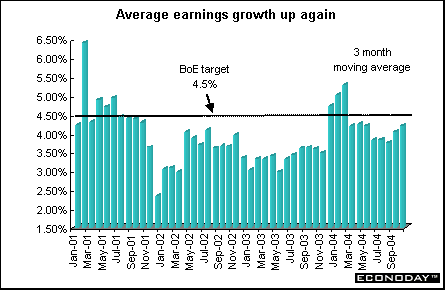
December claimant count unemployment rate remained at 2.7 percent, the lowest level since July 1975. Claimant count unemployment dropped by 6,200 to 826,300. According to International Labor Organization measures, the unemployment rate in the three months through November was unchanged at 4.7 percent. The number of employed was up 99,000 from the preceding three months, reaching 28.49 million, the highest since comparable records began in 1971. The total number of hours worked per week also reached a record. But not all sections of the job market are strengthening. Manufacturers shed 110,000 jobs in the three months though November from a year earlier. The employment rate for working age people was 74.8 percent, up 0.2 percentage points from the previous three months.
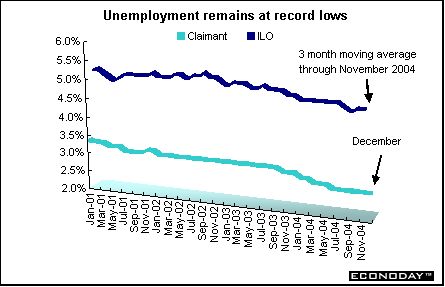
December retail sales sank 1 percent but were up 3.2 percent when compared with December 2003. This was the largest December decline since 1981. National Statistics urged caution against reading too much into the data, noting uncertainties over seasonal adjustments at this time of year. All categories were down except for non-store retailing and repair. Household goods were down 1.2 percent, clothing & footwear were down 1.7 percent and non-specialized stores were down 2.4 percent.
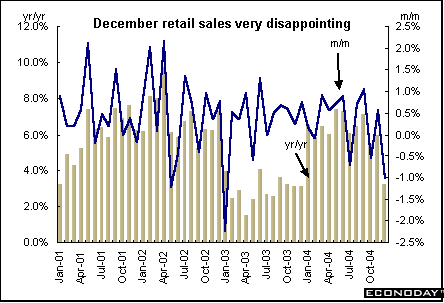
Asia
Japan - November tertiary index was up 0.4 percent and 2.7 percent when compared with last year. The index is a gauge of services demand from both companies and individuals. The all-industry index, which combines the tertiary index with activity in construction, agricultural & fisheries industries, the public sector and industrial output, was up 0.3 percent in November and 2.6 percent on the year. The index is considered a close approximation for gross domestic product growth as measured by industrial and service sector output. The tertiary index makes up about 60 percent of the all-industry index.
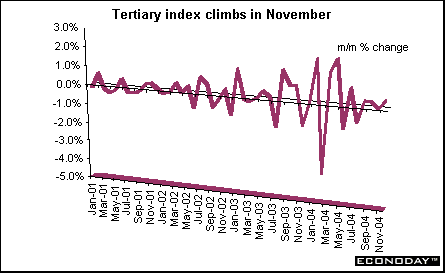
Americas
Canada - December consumer prices were down 0.2 percent but up 2.1 percent when compared with last year. Core CPI, excluding food and energy, was unchanged on the month and up 1.4 percent on the year. The Bank of Canada's preferred core CPI, which excludes eight volatile items, was down 0.1 percent but up 1.7 percent on the year. Gasoline prices are primarily responsible for the December decline in the index. But gasoline is also the primary reason behind full-year price increases along with homeowners' replacement costs, restaurant meals and auto leasing and purchases.
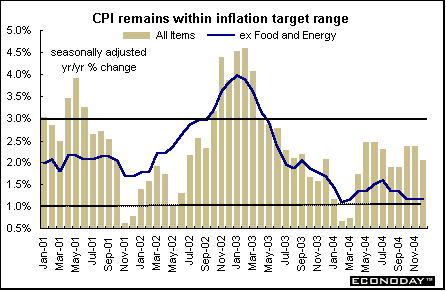
November manufacturers' shipments edged up 0.2 percent and were up 11.1 percent when compared with last year. Unfilled orders were down 1.2 percent but up 4.1 percent on the year. New orders were down 0.5 percent but were 12.1 percent higher than a year ago. Manufacturers continued to face factors beyond their control - rising costs and the soaring Canadian dollar have taken a bite out of manufacturing activity in recent months. The sustained strength of the Canadian dollar continued to render manufactured goods, priced in Canadian dollars, more expensive abroad, a challenge for manufacturers trying to secure and retain foreign customers. Input costs have also soared in 2004. The impact of these obstacles saw new orders decrease to a six-month low. Transportation equipment - down 5.5 percent - and computers - down 3.9 percent - were primarily responsible for the fourth decline in a row. Unfilled orders, which may contribute to future shipments, have also dropped four straight months.
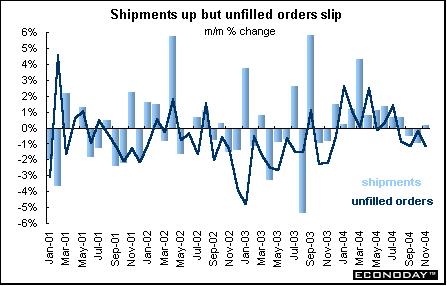
Bottom line
The Bank of Canada will announce its interest rate policy decision on Tuesday. Analysts are expecting the Bank to leave its target interest rate at 2.5 percent. With the Fed expected to raise the Fed Funds rate to 2.5 percent the following week, both countries would have the same policy rate.
Several key Japanese indicators will be released Friday morning (Thursday night in the U.S. ET), among them unemployment and industrial production. Analysts will be looking for signs that the economy has rebounded from its dismal mid-year performance.
Looking Ahead: January 24 through January 28, 2005
